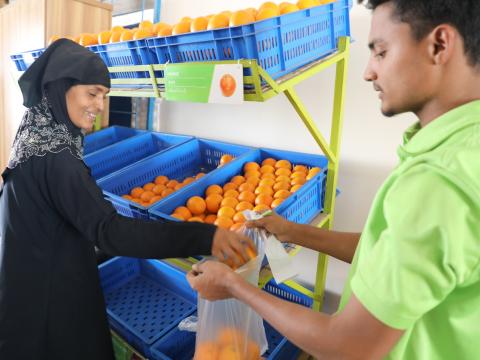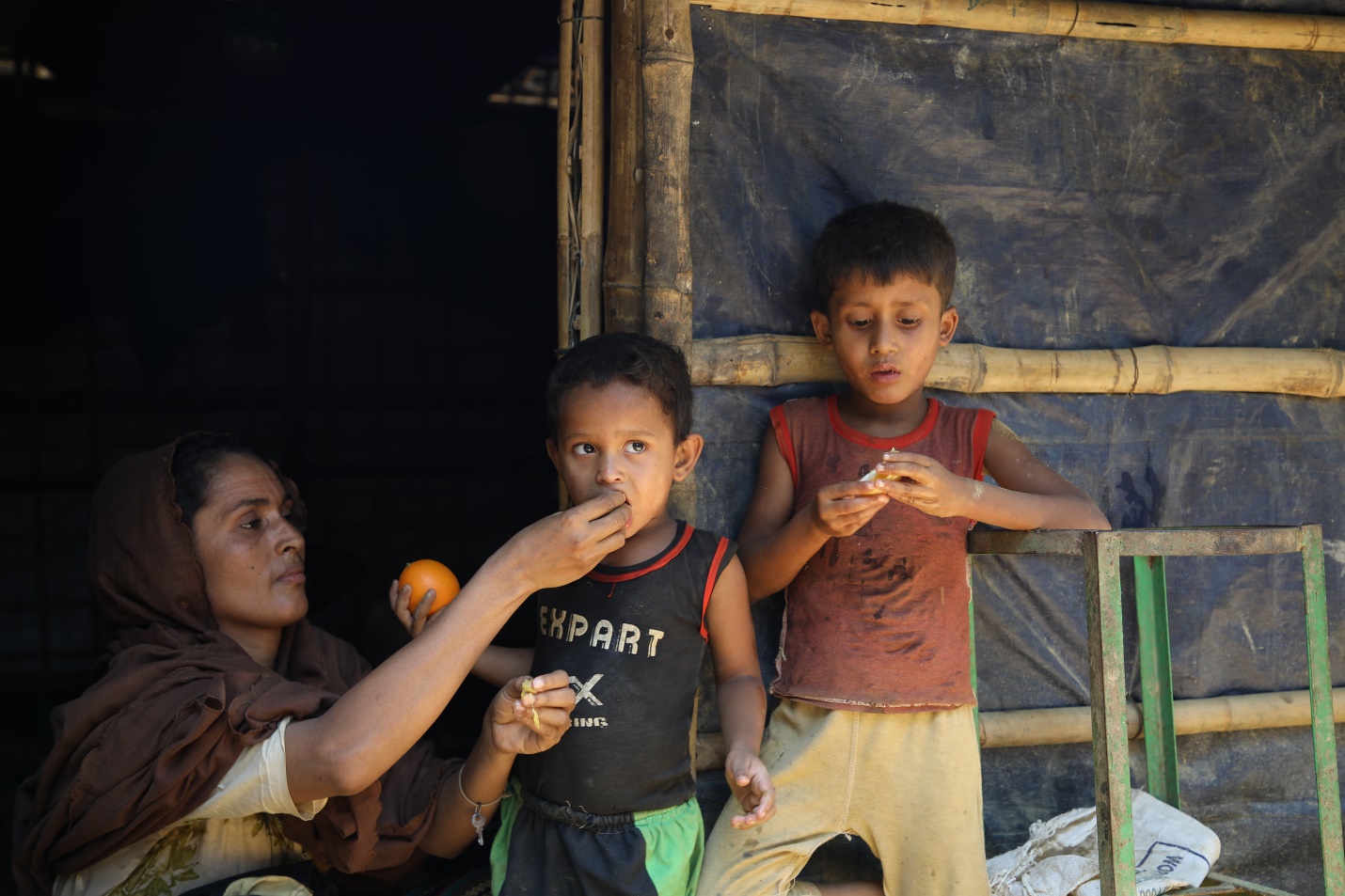Will that be eggs or oranges today? E-voucher food cards let refugees choose what they want to eat, when

For the past 24 months, Rahazan, her husband, Rashid, and their seven children have eaten the same bland bowl of lentils and rice for breakfast, lunch and dinner.
Now, after about 2,000 monotonous such meals, this family can finally choose what they want to eat today. For refugees who have lost everything—including decision making rights over their own diets—such power of choice renews hope and restores dignity.
Like all 1 million people here in the world’s largest refugee camp in Cox’s Bazar, Bangladesh, Rahazan and her family are completely dependent on food aid provided by the World Food Programme (WFP). Since they arrived in the camp two years ago, the family has had to line up monthly for their meagre ration of lentils, rice and oil. Not any more, thanks to the WFP’s new e-voucher system, implemented in partnership with World Vision.
Rahazan is one of 240,000 refugees who received a WFP pre-paid e-voucher card. Each family receives a card loaded with 730 taka (about USD10) per family member. Rahazan’s card allows her to shop at one of a dozen WFP stores in the camps, choosing from 19 fresh food items, including fresh fruit and vegetables, dried fish, eggs, salt, spices and sugar.
The stores are open five days a week from 9:00 a.m. to 4:00 p.m. Rahazan no longer needs to queue all day with thousands of others at centralized distribution points to collect food. She can shop when she wants for what she wants. “Now I can choose and purchase our food in 25 minutes,” says Rahazan, smiling.
Rahazan, 38, and her family are among the 700,000 Rohingya who fled Myanmar in August 2017 to escape extreme violence and decades of human rights abuses. Most walked for six days on average to reach safety in neighboring Bangladesh, arriving hungry and exhausted.
Rahazan painfully recalls the chaos as UN agencies and NGOs tried to feed hundreds of thousands of desperate people lining the muddy roadsides in torrential rain.
“I carried my three-year-old son, Solim and brought my daughter, Tasmin, (age 13) with me to collect food and clothes thrown from relief trucks,” says Rahazan. “We ran in the mud beside the truck, perilously close to its wheels. My children would cry out ‘Give me one! Give me one!’ to the workers. Many times, we were crushed in the crowd. Once my baby boy slipped from my arms. We saw people killed in the stampede during the relief distribution, but we could do nothing. We had to get food for our family. We were lucky to eat one meal a day.”
After one month, a food distribution system was set up to feed the 1 million refugees. Families received monthly rations of lentils, rice and oil—sufficient food to sustain life, but not too appetizing. Salt, spices and sugar were beyond the refugees’ reach. Children and their families need a diversified diet—fresh fruit and vegetables, and protein sources—to develop normally and maintain good health. Desperate for cash to buy fresh food, some families sold extra relief items they had received—buckets and blankets—to buy dried fish, eggs and the odd banana for their children.
“Before I sold aid items and my belongings to buy fish, vegetables, spices and other essentials for my family,” admits Rahazan. “But after getting the e-voucher card, I don’t have to sell anything because I can buy these goods from the shop. For the first time in two years, we can choose the foods we want to eat.”
Rahazan says she sees a difference in her children’s health since she began shopping at the e-voucher store. “My children were becoming weak eating just rice and lentils, but now they are becoming healthier,” says Rahazan. “They don’t go to bed hungry anymore. We have proper meals twice a day with the vegetables I purchase from the e-voucher store.”
Rahazan’s family particularly enjoys fresh fruit from the store—a previously unaffordable luxury. “My children love oranges. They are delighted when I bring them home. They grab them and start eating.”

“I love the fruit my mother buys for us,” says Haikel, Rahazan’s 15-year-old son, peeling an orange. “I want to be a teacher so I can buy fruit for my mother one day.”
The e-voucher food assistance system not only gives Rahazan and other refugee women more nutritious food choices, it also gives them more decision making power over their families’ resources. The e-voucher cards are given to the female heads of households to manage. Women having such power is not always common practice in traditional Rohingya culture where men usually control the household cash and buy the food. “I’m proud that the card is in my name,” says Rahazan.
Walking to the e-voucher store gives Rahazan the opportunity to leave her cramped shelter. Women are not always permitted to leave their homes unaccompanied. Rahazan meets women neighbors at the store, where they discuss prices and talk about her lives. Her world is no longer limited to her shelter.
To date, about one-third of the refugee population is assisted through10 e-voucher retail outlets. WFP plans to transition 100 percent of the refugees to the e-voucher system by December 2019.
While benefitting the refugees, the programme is also strengthening the local economy. Bangladeshi vendors stock the shops, supplying up to USD 1 million in locally grown food each month.
World Vision plays a critical role in managing the e-voucher shops, in partnership with WFP. Staff members go door-to-door in the camps to inform refugees about the new system and register them. They also handle any complaints or concerns, such as lost cards, and work with vendors to ensure that every shopper’s food is accurately measured, weighed and properly debited from the e-voucher card. World Vision also provides porters who carry heavy loads home for single mothers, the elderly and disabled refugees.
“I’m proud of this programme that is changing lives by giving refugees—especially women—more choices and thus more control over their lives,” says Ryan Belasso, Lead for World Vision’s Cash, Food Security and Livelihoods unit of the refugee emergency response.
Story: Mahmudul Hasan, Karen Homer Photographer: Md. Shabir Hussain